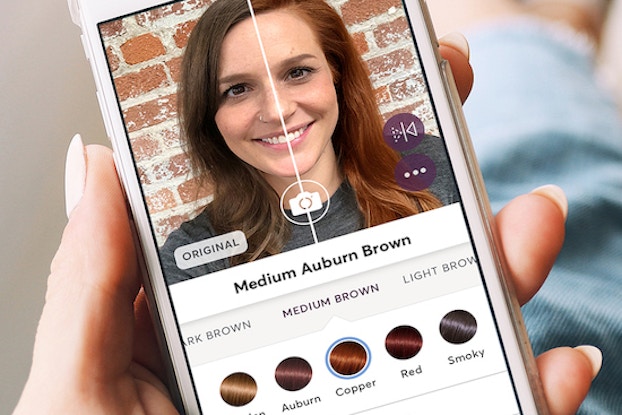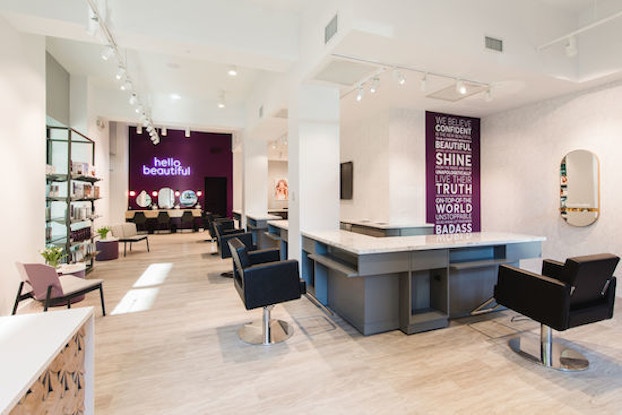
“Mommy, are you gonna do it?”
When Amy Errett’s nine-year-old daughter, Madison, asked if she was going to finally start her hair care business, it really struck a chord. She got in her car that morning, on her way to work as a venture capitalist, and she realized it was time.
“I started growing more and more concerned with the ingredients in personal care, at home and in life,” said Errett, now the CEO of at-home hair care disruptor, Madison Reed. After researching personal care products and having many conversations with friends, Errett looked specifically toward the $46 billion hair color industry. “I was completely blown away by the ingredients,” she said.
Since its founding in 2013, Madison Reed, named, aptly, after Errett’s daughter, has since blossomed into a 100-employee company that provides women with a hair care option that the industry has been lacking: a DIY, at-home hair color which aims for conscientious ingredients sans harsh chemicals and a budget-friendly price tag.

Interested in a small business membership?
Find out how the U.S. Chamber of Commerce can help your company grow and thrive in today's rapidly-evolving business environment. Connect with our team to learn how a small business membership can benefit your bottom line and help you achieve your goals.
The digital native brand that operates six of its own brick-and-mortar salons is now also making a bold leap into mainstream retail: It’s expanding to more than 1,200 Ulta stores via an exclusive partnership with the beauty retailer.
‘The best market research lies within the people you know’
Errett says her first inkling that she needed to start a new kind of hair care business came from dinners with friends, in which they’d often discuss what products they were using.
Traditionally, there had only been two longstanding options when it came to hair color: purchase an inexpensive box off the shelf, that likely contained chemical-laden ingredients, minimal instructions and offered a lackluster finished product; or, go to a traditional salon and spend several hours — and dollars.
In fact, two 2019 studies from Mintel on hair color and product trends found that the biggest reason for avoiding at-home hair color was fear of hair damage, as reported by 22% of female respondents, and that an increasing number of women and young adults have become ingredient-conscious — searching for products that include “familiar” ingredients, rather than an extensive laundry list of chemicals.
Madison Reed responded to these concerns by unveiling its Smart 6-Free hair color formula — free of ammonia, parabens, resorcinol, PPD, phthalates, and gluten — and instead offering customers products containing ingredients like argan oil, ginseng root extract and keratin.
“Many women feel like there are no alternatives,” Errett told CO—. Her goal in creating Madison Reed was to provide them with just that: a budget-friendly, direct-to-consumer, conscientiously made hair color solution that satisfies all of their concerns.

Tackling the ‘why,’ instead of the ‘what’
Early on, Errett’s biggest struggles as an entrepreneur all pertained to creating the product —finding a manufacturer, ensuring that her values were reflected in the integrity of the product, and navigating the rules on how to get the product from its Italian manufacturer into the United States, she said.
“The best consumer business models are the ones that solve a pain point,” she explained, knowing that in order to disrupt an industry with such a traditional history, she had to take her time.
Errett’s research included lots of user testing. She paid women to dye their hair with her product in their own bathrooms and record themselves, in order to perfect the product’s step-by-step instructions. It took about nine months to achieve the finished product.
The process helped solidify Errett’s core mission: Madison Reed was to be a “why” brand, not just a “what” brand.
“Life-changing brands are about the why. This is a why company. We believe that women deserve better, and that confident is the new beautiful,” Errett said.
Life-changing brands are about the why. This is a why company. We believe that women deserve better, and that confident is the new beautiful.Amy Errett, founder and CEO, Madison Reed
How Madison Reed’s premise lies in rethinking beauty industry norms
“The world has told us that being older is terrible, that we have to look a certain way, be a certain way, that we can’t have it all,” Errett said. “This company stands for the opposite.”
Madison Reed’s full-service color kits, complete with customized instructions and every item needed for the DIY treatment — down to the gloves and cleansing wipes —not only aim to satisfy the conscientious factor with cleaner ingredients, but also the budget factor, with prices at under $30 per kit.
By tackling those traditional, longstanding aspects of hair care, Madison Reed is setting out to alter societal norms to show its customers that they can, actually, have it all.
“Women deserve better,” she said. Better ingredients, better outcomes, better matching, without being forced to subject their time, money, or appearance — this is what Madison Reed offers, and what women both want and should have, she said.
Brick-and-mortar expansion encourages ‘dualists,’ instead of punishing them
In the world of hair care, “dualists” are the women who do their best to make it to the salon, realize they can’t (whether due to lack of time or sufficient funds), so they opt for what can be the dreaded at-home dye — and they’re shamed for it.
Madison Reed decided to turn this game around by opening six brick-and-mortar salon locations, with the goal of encouraging this group of women instead of beating them down.
While the direct-to-consumer, do-it-yourself product model works for many, there are women who still want the salon experience, Errett said. She has found that many customers still crave the in-person comfort factor, and are either repeat salon visitors, or they go to the salon for their initial color matching and dye job and take the task on themselves thereafter.
Displaying their aim of transparency, from their ingredients to their salon treatments, “Each customer gets an email or receipt showing the color we put on their hair,” Errett said. Compared to traditional salons, Madison Reed’s business model allows clients the ability to attend a salon, but also replicate the same outcome at home, on their own time, at a lesser cost.

‘Meet Madi’: How Madison Reed’s use of AI and AR helps ensure client satisfaction
For a digitally-native hair care brand, Madison Reed needed to leverage technology in such a way that customers were comfortable enough to not only order a product without physically seeing it, but to also apply it, alone and semi-permanently, to their heads.
“We built a 14-step questionnaire, emulating what a professional stylist would do when assessing your hair,” Errett explained. Questions include hair texture, whether or not the hair is already color treated and what percentage of gray it currently has.
The answers to these questions then go into an algorithm that generates the best shade options for the customer.
In addition to its questionnaire, the company took technology two steps further: by incorporating an artificial intelligence (AI)-powered chatbot; and an augmented reality (AR) feature.
Madi, its color-matching chatbot, can be accessed through text message and Facebook message. She offers the customer options like, “Get Color Matched” or “Live Chat Support.” If the customer chooses to get color matched, a selfie can be sent directly to Madi so she can provide color suggestions.
Madison Reed has also equipped its website with AR by allowing customers to upload photos of themselves to “try on” the different hair color options. You can see each color against your natural skin tone and eye color, Errett explained.
Strengthening from the root: from one employee, to one hundred
As with many startups, Madison Reed began with its one founding employee: Amy Errett. Now, the company has expanded to a bustling business of 100 employees.
The creation, distribution and technology of and behind the product are all imminent factors, but Errett is quick to point out that the true “heart and soul” of the business is made up of its employees.
The company’s entire team of customer care experts are all licensed colorists, which Errett explains is a key factor in encouraging the comfort level for purchasing, especially for new customers who have never before dyed their own hair.
Errett also emphasized how success in business requires much more than just a good idea. Once you establish that you have a business, you have to figure out how to grow and retain your customers, she said. This involves reformulation, flexibility and best hiring practices.
“As people contemplate becoming entrepreneurs, the number one characteristic I look for is resilience,” she explained. “It’s not about ‘not’ making mistakes. It’s all about making mistakes. If you pay attention to them, and see them as growth opportunities, that is how life changes quickly.”
CO— aims to bring you inspiration from leading respected experts. However, before making any business decision, you should consult a professional who can advise you based on your individual situation.
CO—is committed to helping you start, run and grow your small business. Learn more about the benefits of small business membership in the U.S. Chamber of Commerce, here.




